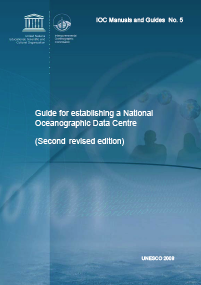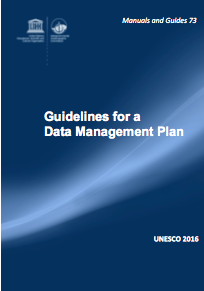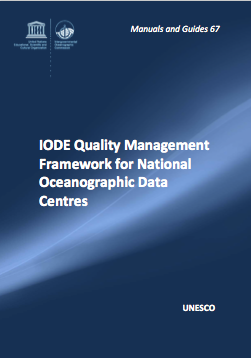On this page you will find answers to a few common questions:
- How to establish a National Oceanographic Data Centre
- How to inform IOC of the nomination of an IODE national coordinator for data or information management?
- How to develop a Data Management Plan
- How to get accreditation for your NODC
- How to set up an IODE Associate Data Unit (ADU)
- How to set up an Associate Information Unit (AIU)
1. How to establish a National Oceanographic Data Centre?
The answer to this question can be found in IOC Manuals and Guides No. 5 (2nd revision) published in May 2008. This Guide is intended as a tool for policy makers at the national level to assist them with the decision-making related to the establishment of national facilities for the management of oceanographic data (and information). It is also intended to be a reference document for national organizations involved in, or planning to be involved in, oceanographic data and information management.
for the management of oceanographic data (and information). It is also intended to be a reference document for national organizations involved in, or planning to be involved in, oceanographic data and information management.
Download the document HERE
2. How to inform IOC of the nomination of an IODE National Coordinator for data or information management?
In order for the IODE Secretariat to communicate effectively and efficiently on matters related to IODE, it was decided that each IOC Member State should have an IODE national coordinator for ocean data management, and an IODE national coordinator for marine information management. To inform IOC please send an email or letter to:
Peter Pissierssens
Head, IOC/UNESCO Project Office for IODE
IODE Programme Coordinator
Wandelaarkaai 7
8400 Oostende BELGIUM
Tel: +32 59 34 01 58
Fax: + 32 59 34 01 52
email: This email address is being protected from spambots. You need JavaScript enabled to view it.
Please also register national coordinators in OceanExpert (http://www.oceanexpert.net) and inform the above mentioned IODE programme coordinator when a coordinator is replaced.
 IODE published in 2016 the IOC Manuals and Guides No. 73 (Guidelines for a Data Management Plan).
IODE published in 2016 the IOC Manuals and Guides No. 73 (Guidelines for a Data Management Plan).
A data management plan is a formal document outlining how research data will be managed, stored, documented and secured throughout a research project as well as planning for what will happen to the data after completion of the project. The data management plan is intended to provide descriptive details of the data, the processes, the decisions, as well as identifying roles and responsibilities. This also includes a long-term data sharing and preservation plan to ensure data are publicly accessible beyond the life of the project. A data management plan is often a requirement of funding agencies. The IODE encourages all researchers to prepare a data management plan for research projects that will collect marine data and to ensure the data generated by research projects be permanently archived in the IODE network of National Oceanographic Data Centres (NODCs).
The IODE Committee adopted Recommendation IODE-XXII.18 which established the IODE Quality Management Framework (IODE-QMF). IODE-QMF provides overall strategy, advice and guidance for NODCs to design and implement Quality Management Systems (QMS) for the successful delivery of oceanographic and related data, products and services and to ensure NODCs can demonstrate their capabilities to provide data and services in compliance with established standards and responsibilities that will lead to accreditation. The IODE encourages NODCs to implement a QMS and to demonstrate they are in conformity with ISO 9001, the international standard for quality management.
Accreditation requirements
 NODCs seeking formal accreditation will need to meet a minimum set of requirements to ensure compliance with IODE standards and to establish a mechanism to regularly monitor and assess the quality of data and service. NODCs will need to demonstrate their ability to provide secure long-term storage of and access to marine data. The IODE committee has established accreditation criteria to ensure NODCs meet these requirements. Submissions for accreditation should address all the accreditation criteria which can be found in IODE Quality Management Framework for National Oceanographic Data Centres. (IOC Manuals and Guides 67).
NODCs seeking formal accreditation will need to meet a minimum set of requirements to ensure compliance with IODE standards and to establish a mechanism to regularly monitor and assess the quality of data and service. NODCs will need to demonstrate their ability to provide secure long-term storage of and access to marine data. The IODE committee has established accreditation criteria to ensure NODCs meet these requirements. Submissions for accreditation should address all the accreditation criteria which can be found in IODE Quality Management Framework for National Oceanographic Data Centres. (IOC Manuals and Guides 67).
Accreditation process
The accreditation process comprises the following steps:
- Submission of accreditation application in response to the IODE Accreditation Requirements to the IODE Steering Group for Quality Management Framework (SG-QMF) through the IODE Secretariat;
- Review of the accreditation application the SG-QMF;
- Response from SG-QMF to applicant
- Formulation of recommendation regarding accreditation for consideration by the IODE Officers;
- Decision by the IODE Officers, on behalf of the IODE Committee.
Successful applications will be awarded the status of Accredited IODE National Oceanographic Data Centre.
Prepare your accreditation submission
The steps required to prepare a submission for accreditation include:
- Develop and implement a Quality Management System (QMS). A QMS consists of a set of rules (procedures) that an organization decides to follow in order to achieve its objectives related to the quality of its products and services. Such a system contains, for example, rules concerning the general management of the organization and makes reference to the technical procedures which have to be followed, the quality controls which are performed on the products or services and the actions to be taken if the products or services do not comply with the requested specifications.
- Prepare a Quality Manual which documents the scope of an organization’s QMS, including references to documented policies and processes, and describes the scope and extent of the QMS.
- Complete the IODE accreditation check list and provide relevant documentation that your QMS meets the requirements.
- If your organization has a certified QMS (for example ISO 9001 certification), provide evidence.
- Submit accreditation request to the SG-QMF
The IODE Associate Data Unit is inteded to bring in the wider ocean research and observation communities as key stakeholders of the IODE network, taking into account the growth of ocean research and observation programmes and projects, and the ability of these projects to establish data systems.It is important for these communities to share, provide access to and preserve all ocean research and observation data.
By joining IODE as an ADU projects, programmes, institutions or organizations will get the following benefits:
- Receive information on, and contribute to, IODE standards and best practices related to ocean data management,
- Be welcomed to participate in ocean data and information management training, organized within the framework of the IODE OceanTeacher programme
- Receive assistance, upon request, from IODE, on matters related to ocean data management,
- Be invited, as observers, to participate in Sessions of the IODE Committee,
- Participate in IODE workshops and projects,
- Share expertise with other ADUs and NODCs,
In return the global community, through the IODE National Oceanographic Data Centres, will benefit from the ADUs as these will be invited to share their data and information on their data collection (metadata catalogue), and this should be through their NODC (in the case of national projects, programmes, institutions or organizations), or through another IODE data facility (in the case of regional or international projects, programmes, institutions or organizations) or, in the case of biogeographic data, through iOBIS.
Applying to become an ADU
Any project, programme, institution or organization that wishes to join IODE as an IODE Associate Data Unit should contact the IOC Project Office for IODE (email to This email address is being protected from spambots. You need JavaScript enabled to view it.) and provide the following information:
- name and contact information of the ADU contact point(s);
- name and contact point of the head of the applicant entity;
- description of the national, regional or international project, programme, institution or organization;
- brief description of data services/products provided by the entity;
- for projects: expected lifespan of the project and indication of plan for the archival/preservation of the data, data management plan;
- letters of support;
- required expertise, training that IODE could contribute;
- data policy (if identified) of the applicant entity;
- of the existing relationship with a NODC.
An application form can be downloaded here (Ms-Word format). It should be filled and signed. When submitting please send us the MS-Word version (with signature) as well as a scanned version (with signature). Please also discuss your application with your NODC (if existing) as well as with your IOC national contact as the ADUs should work closely with the NODCs (if existing).
Applications shall be reviewed by the IODE Officers (by email or during IODE Officer meetings) in consultation with - and in the case of national projects, programmes, institutions or organization, subject to approval by the relevant NODC (if existing) - SG-OBIS (for biogeographic information) or other relevant recognized international programme.
Find out more about ADUs here
IODE Associate Information Units (AIUs) shall:
- Be national projects, programmes, institutions or organizations, or regional or international projects, programmes, institutions or organizations (including academia) that carry out marine information management functions,
- Be staffed by at least one marine information professional (by qualification or experience),
- Receive information on, and contribute to, IODE standards and best practices related to marine information management,
- Be welcomed to participate in ocean data and information management training, organized within the framework of the IODE OceanTeacher Global Academy programme,
- Participate in IODE workshops and projects,
- Share expertise with other AIUs,
- Be invited to share new digital initiatives implemented within the AIUs,
- Provide advice and where appropriate become an IODE Project member,
- Receive assistance, upon request, from IODE, on matters related to marine information management,
- Closely link with the IODE National Coordinator for Marine Information Management if existing
- Agree to display IODE logo on appropriate marine information output
- Agree to make available information management documentation (standards, practices, guides,...) used by the AIU for the wider marine science library and information community,
Applying to become an AIU
Any marine science related project, programme, institution or organization that is willing to comply with the above-mentioned Terms of Reference can apply to join IODE as an IODE Associate Information Unit (AIU). The application form is available from THIS LINK..
Information that should be provided includes:
- name and contact information of the AIU contact point(s);
- name and contact point of the head of the applicant entity;
- description of the national, regional or international project, programme, institution or organization;
- brief description of information services/products/digital initiatives provided by the entity;
- description of staff and skills/expertise;
- metrics on budget and collections;
- for projects: expected lifespan of the project and indication of plans for the archival/preservation of the information output;
- letters of support;
- required capacity building, training that IODE could contribute;
- information on the existing relationship with IODE.
Applications for AIUs shall be reviewed by the Joint IODE/IAMSLIC Group of Experts on Marine Information Management (in a transitional capacity) and approved by the IODE-MG (by email or during IODE-MG meetings).
- Details
-
Created on: Wednesday, 14 May 2008 13:58
-
Last Updated on: Wednesday, 11 October 2017 16:20